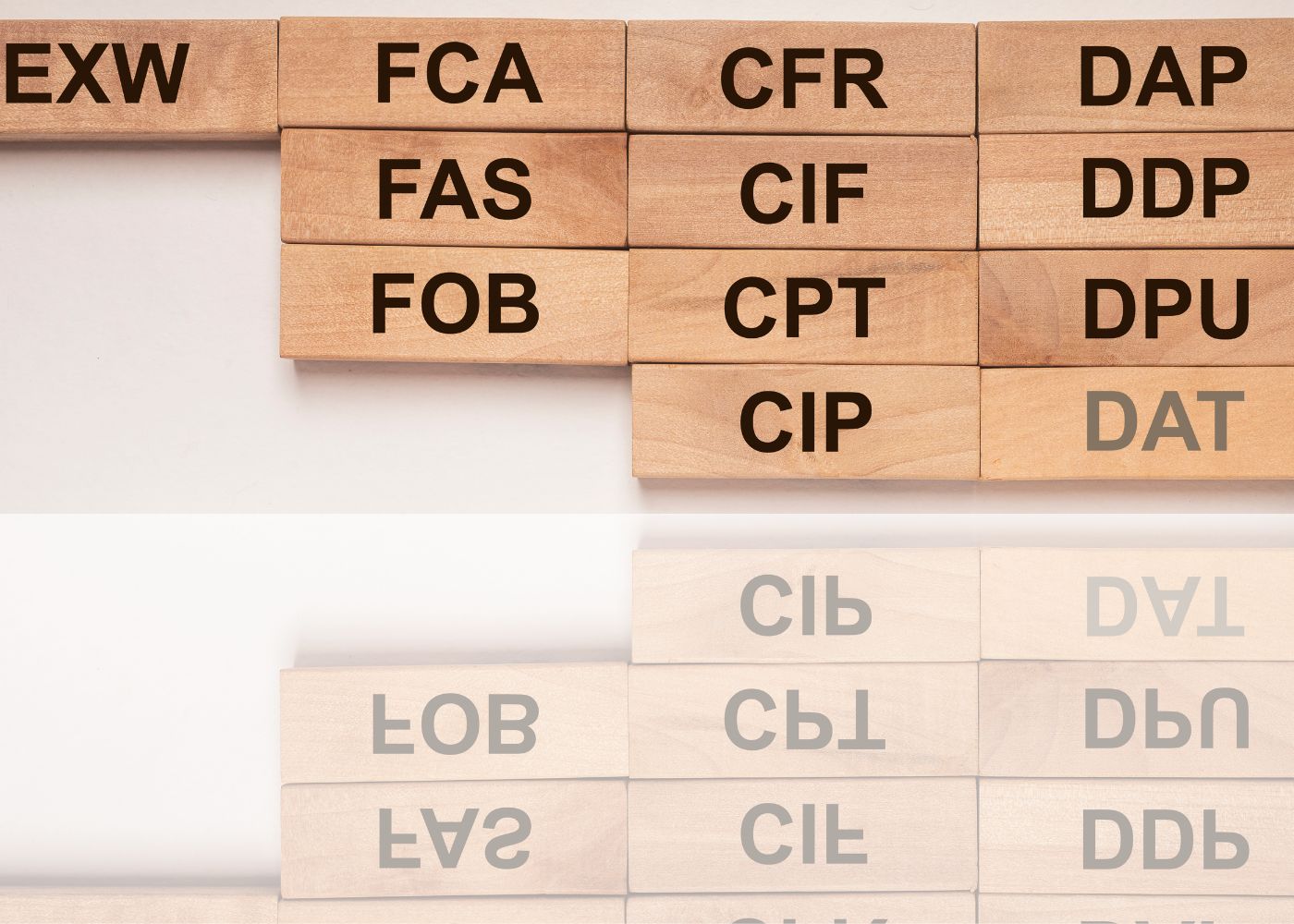Incoterms were created in response to a recurring problem in international trade: the confusion and disputes caused by differences in commercial practices and transport responsibilities between countries. What is an Incoterm? What role do the different Incoterms play in international trade? How is this very special commercial language used? Find the answers in this article!
What are Incoterms?
Let's take the example of a French seller shipping goods to a buyer in China. Who is responsible for transport costs? Who assumes the risks during transport? In the event of damage in transit, is the seller or the buyer responsible for the damage? These questions, if poorly defined, can lead to costly disputes and delivery delays.
To solve these problems, the International Chamber of Commerce (ICC) has introduced Incoterms, the contraction of International Commercial Terms. These are a codified set of standard contractual provisions, revised every ten years to keep pace with changing commercial practices.
Incoterms clearly establish the conditions of delivery of goods under a sales contract. They specify the reciprocal obligations of seller and buyer, allocate transport costs, and determine the point at which risk is transferred from seller to buyer. By providing a universal framework, this commercial language facilitates the fluidity of international transactions and reduces the risk of misunderstandings.
What is the purpose of Incoterms? 3 essential roles
The mission of Incoterms in international trade is to bring clarity and uniformity to transactions. They facilitate communication between parties and reduce the risk of misunderstandings and disputes.
1. Incoterms distribute costs and risks
Clearly defining the responsibilities of buyers and sellers with regard to the costs and risks involved in transporting goods helps prevent disputes. Each Incoterm specifies who pays for each aspect of transport (packing, loading, carriage, insurance, customs duties, etc.) and at what precise point the risk of loss or damage is transferred from the sender to the receiver. This avoids costly misunderstandings and promotes smooth business transactions.
2. Incoterms simplify communication
Incoterms provide a standardized language for international trade terms, simplifying exchanges between parties, even if they don't speak the same language.
3. Incoterms adapt to changes in international trade
Incoterms are not fixed; they are updated by ICC approximately every ten years to reflect developments in international trade. This ability to adapt ensures that they remain relevant and useful to companies.
Good to know: Incoterms are not intended to regulate the transfer of ownership of goods, their sale price, or the terms of payment. These points are defined in the contract for the sale of goods.
What are the 4 Incoterms families?
The current version of Incoterms, which came into force on January 1, 2020, groups 11 Incoterms into four main families, each defining specific responsibilities for the seller and buyer.
Group E Incoterms
Incoterms in this group impose a minimum obligation on the shipper. He must only make the packaged goods available to the buyer at his own premises. The seller is not responsible for loading the goods onto the means of transport, nor for transporting them to the final destination.
Example: Incoterm EXW(Ex Works) is used when a seller makes goods available at his factory or warehouse. The buyer assumes all transport costs and risks from this point onwards.
Group F Incoterms
In this group, responsibility for risks and costs lies with the buyer, as soon as the goods are handed over to the carrier designated by the buyer. The seller organizes and pays the costs up to delivery to the carrier, but does not assume the main carriage.
Example: Incoterm FCA(Free Carrier) means that the seller delivers the goods to an agreed location, where they are handed over to the carrier chosen by the buyer. FAS(Free Alongside Ship) and FOB(Free On Board) are used for sea shipments, where the seller delivers the goods alongside the ship or on board the ship respectively.
Group C Incoterms
Group C Incoterms oblige the seller to pay the main freight costs, but the risk is transferred to the buyer as soon as the goods have been shipped. This means that even if the seller pays for transport, he is not liable for loss or damage after shipment.
Example: CFR(Cost and Freight) and CIF(Cost, Insurance and Freight) are terms where the seller pays for carriage to the port of destination, but the buyer assumes the risk on embarkation. CPT(Carriage Paid To) and CIP(Carriage and Insurance Paid To) are similar, but apply to all modes of transport.
Group D Incoterms
Group D imposes maximum liability on the seller. He assumes the risks and costs of transport until delivery to the buyer at the agreed location. This means that the seller is responsible for the goods all the way to their final destination.
Example: DAP(Delivered At Place) means that the seller assumes all risks and costs until the goods are delivered to the designated location. DPU(Delivered at Place Unloaded) indicates that the seller must also unload the goods.
For a detailed understanding of the Incoterms in force since 2020, see our complete guide to Incoterms 2023.
How to use Incoterms in international logistics?
To use Incoterms effectively in international logistics, they must be properly integrated into the sales contract, to minimize the risk of disputes. Here are the key steps:
- Select the appropriate Incoterm: choose the Incoterm according to the company's organizational capabilities, the type of transport used, the nature of the goods, the desired level of service, and market practices.
Can't decide which Incoterms to use for your commercial transactions? Your dedicated D&fiGroupe contact will help you make the right choice.
- Include the Incoterm in the sales contract: explicitly mention the chosen Incoterm in the contract to clarify the parties' responsibilities and obligations.
- Negotiate terms: discuss and agree on the Incoterm chosen with the other party, taking into account each party's preferences and logistical capabilities.
- Train teams: ensure that all parties involved fully understand the Incoterm used and its practical implications on transport and delivery operations.
- Keep up to date: keep abreast of periodic revisions of Incoterms to adapt to changes in international trade practices.
A concrete example of the use of Incoterms
A French company, the shipper, sells industrial machinery to a company in Brazil, the receiver. Both parties choose the Incoterm CIF(Cost, Insurance and Freight) for the transaction.
Steps for using the CIF Incoterm
- Preparation and packing: the French company packs the machines and prepares the necessary documents for export.
- Transport to port of departure: the seller organizes the transport of the machines to the port of departure in France and pays the costs associated with this transport.
- Main freight and insurance: the shipper selects and pays the ocean carrier to ship the machines to Brazil. He also takes out insurance to cover risks during sea transport. The cost of transport and insurance is included in the sales price.
- Transfer of risk: once the machines are loaded on board the ship, the risk of loss or damage passes from the seller to the buyer. However, the seller remains responsible for costs up to the port of destination in Brazil.
- Unloading and import formalities: on arrival at the Brazilian port, the buyer is responsible for unloading the machines and completing import formalities, including payment of customs duties and local taxes.
- Transport to final site: the buyer organizes and pays for the transport of the machines from the port of destination to its final site in Brazil.
Advantages of the CIF Incoterm in this example
- For the seller: responsibility for the risks is limited once the machines have been loaded on board the ship, while the main transport and insurance costs are included in the selling price.
- For the buyer: he benefits from insurance cover for the machines during sea transport, and only has to organize transport from the port of destination, thus simplifying part of the logistics.
The importance of Incoterms in international trade: what you need to know
Incoterms play an essential role in international logistics management. They contribute to a clear distribution of costs and risks, simplify communication between parties, and adapt to changes in international trade. Understanding and complying with Incoterms enables companies to manage logistics efficiently and hassle-free, ensuring smooth and transparent transactions.
What Incoterms do
- Allocation of costs and risks: Incoterms clearly define the obligations of each party with regard to transport costs, insurance and the risks associated with transporting goods.
- Facilitating communication : by offering a standardized language, Incoterms minimize ambiguities and misunderstandings between buyers and sellers.
- Adaptability to change: Incoterms are regularly updated to reflect changes in international trade, ensuring their continued relevance.
- Logistics management: Byclarifying responsibilities, Incoterms help companies to plan and execute logistics operations efficiently.
What Incoterms don't do
Incoterms are not a substitute for a sales contract. They do not deal with the following aspects:
- the specific characteristics of the goods sold;
- time, place, method or currency of payment ;
- remedies for breach of contract ;
- the consequences of delays and other breaches of contractual obligations;
- sanctions ;
- prices ;
- import/export bans;
- force majeure ;
- intellectual property rights ;
- settling disputes in the event of violation.
Moreover, Incoterms do not deal with the transfer of ownership of goods sold. This is usually covered by a retention-of-title clause in the sales contract or in the GCS (General Terms and Conditions of Sale).
Did you find this article useful? To find out more about the Incoterms in force in 2023, see our complete guide to Incoterms 2023.
And if you'd like to be accompanied by a dedicated expert for all your logistics operations in France and abroad, contact our proactive customer service.
Sources :





0 comments